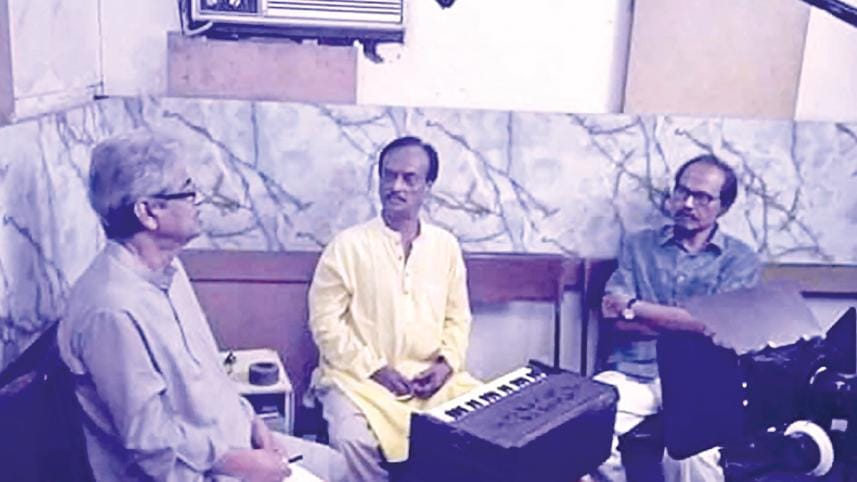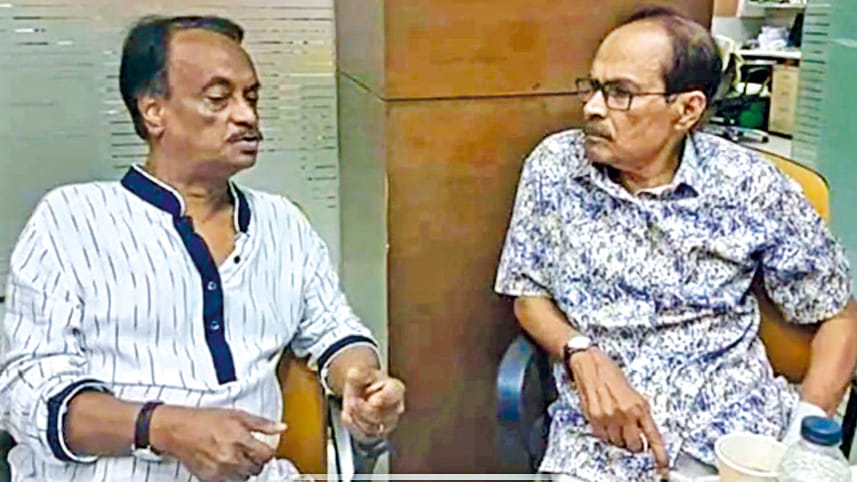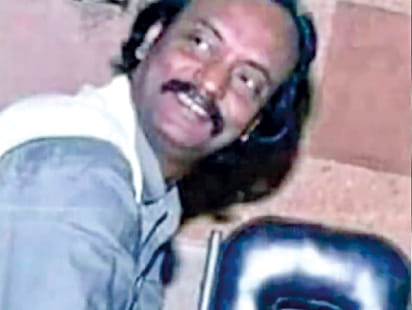Alauddin Ali and his unforgettable melodies


Initially published on June 15, 2007
It was one of those rare moments when I caught a glimpse of renowned composer Alauddin Ali, oblivious to the world around him, humming a catchy tune he probably just came up with. As I continued working on my songs in Sruti Studio, I occasionally saw him from the other side of the glass window.
Seeing the nonchalant way the piece of paper was left on the harmonium, my first intuition was that Ali was possibly creating yet another classic like O amar Bangla ma tor, Shurjodoy-e tumi, Prothom Bangladesh amar shesh Bangladesh, Achhen amar mokhtar, Hai-re kopal mondo, Keu konodin amar-e tho, Tumi aarekbar ashiya, Ei duniya ekhon tho aar shei duniya nai, Harano diner moto, among others. This certainly was not the time to intrude into his world, I reckoned.
It has been nearly two decades that we ran into each other once more. We talked about the days at the Shahbagh radio station, when he had not yet made his mark as a composer. Our conversation veered on his vast popularity as a music director.

AlauddinAli's father, Jadob Ali, was a staff artiste at the radio. His uncle, Ustad Sadek Ali and cousins Dhir Ali Miah, Mansur Ali, Yunus Ali and Momotaz Uddin were all renowned music directors and composers of the Dacca Radio Station during the 60s.
When Ali was only a student of class three, his uncle, UstadSadek Ali had given him a Chinese violin as a gift. At that age he would be on the tabla, accompanying his sister while she practised on the sitar; he even ventured on his father's esraj, composing tunes.
"In 1964, I won the 'All Pakistan Children's Award' for violin from President Ayub Khan. It was at that point that I dropped anchor in the world of music. I realised I was going to be here for the rest of my life," he had said.
By 1967-68, Ali, besides practicing violin, learnt the piano under music director Karim Shahabuddin. "I spent almost 18 to 20 hours practising every day, which gave me confidence to emerge as a violinist in playbacks," he had mentioned.


Ali feels fortunate enough to have worked under eminent music composers like Khan Ataur Rahman, Altaf Mahmud and Robin Ghosh. In 1970, his urge to work in music direction intensified as he got the opportunity to assist late Altaf Mahmud. Prominent music directors Dhir Ali Miah, Mansur Ali and Anwar Parvez also guided him for several years.
Ali made his debut as a music composer through the film Shondhikkhon in 1974. In 1977 his compositions for the films Golapi Ekhon Train-e and Fokir Mojnu Shah earned him enormous popularity.
Ali was selected as the best music director and composer for three consecutive years (1978-80), which opened the door for him to work at HMV in India.
In 1978, one his best-selling albums featuring the diva Runa Laila was released. "The album broke all previous records and my songs attained greater popularity in West Bengal. In the last 20/25 years I'd recorded several songs in Dhaka, Kolkata, Mumbai, Lahore and Karachi. I consider myself fortunate that I've been able to have this kind of exposure," he had said.
His genius did not go unrecognised as he received the greatest number of National Awards as a music director in our country.

In 1990, during the grand celebrations of 300th anniversary of Kolkata, Ali was accorded a reception at Salt Lake Stadium in the city, along with maestros including Salil Chowdhury and others. He was the music director for the SAAF Games Ceremony in 1993 at Dhaka Stadium, where over 8000 artistes sang to his tune."Many prominent singers of the subcontinent have sung my compositions. A reputed French music company has included the background scores for the movie ShurjoDighol Bari, composed by me, in the curriculum of several music schools," Ali had said.
Speaking on upcoming talents, Ali saw no alternative to proper grammatical know-how. Despite access to modern electrical gadgets, it is next to impossible to venture into this field without a firm foothold in the basics of music, he had asserted.
"Substandard lyrics and compositions are an embarrassment. Audio piracy has fuelled this unwanted phenomenon, where people (I do not like to call them composers) simply copy or lift off popular (mostly Hindi) songs, in an attempt to become famous overnight," he had said."Stern measures should be taken against them or we will soon lose our identity and like a tree with its roots severed, wither away into oblivion."
The author is a famed Nazrul Sangeet exponent and the Chief of Culture Initiatives, The Daily Star.



 For all latest news, follow The Daily Star's Google News channel.
For all latest news, follow The Daily Star's Google News channel.
Comments